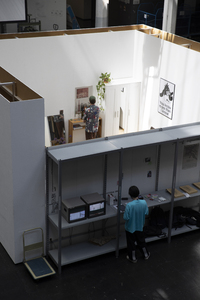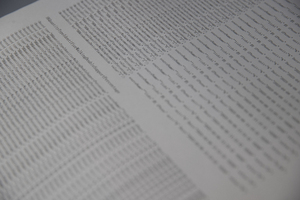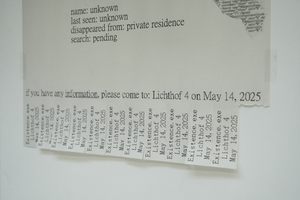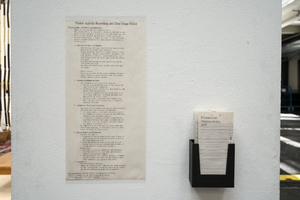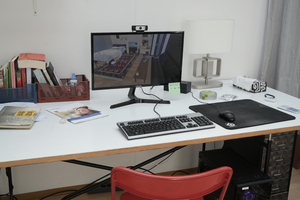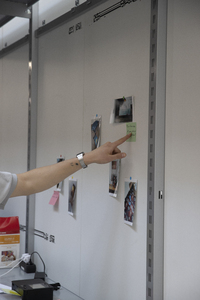"Websites der Fachbereiche"
| Begriff | Websites der Fachbereiche |
| Metakey | Freigabe Nutzung HfG (rights:usage_hfg) |
| Typ | Keyword |
| Vokabular | Rechte |
1799 Inhalte
- Seite 1 von 150
existence.exe
- Titel
- existence.exe
- Autor/in
- Kategorie
- Typ des Projekts/Werks
- Schlagworte
- Datierung
- 14.05.2025
- Titel
- existence.exe
- Urheberrechtshinweis
- © Wei Wang
- Rechtsschutz/Lizenz
- Freigabe Nutzung HfG
- Medienersteller/in
- Beziehung/Funktion
- Projektleiter/in
- Semester
- Studiengang
- Typ der Abschlussarbeit
- Importiert am
- 18.05.2025
- Übergeordnete Sets
- 1
existence.exe
- Titel
- existence.exe
- Autor/in
- Kategorie
- Typ des Projekts/Werks
- Schlagworte
- Datierung
- 14.05.2025
- Titel
- existence.exe
- Urheberrechtshinweis
- © Wei Wang
- Rechtsschutz/Lizenz
- Freigabe Nutzung HfG
- Medienersteller/in
- Beziehung/Funktion
- Projektleiter/in
- Semester
- Studiengang
- Typ der Abschlussarbeit
- Importiert am
- 18.05.2025
- Übergeordnete Sets
- 1
existence.exe
- Titel
- existence.exe
- Autor/in
- Kategorie
- Typ des Projekts/Werks
- Schlagworte
- Datierung
- 14.05.2025
- Titel
- existence.exe
- Urheberrechtshinweis
- © Wei Wang
- Rechtsschutz/Lizenz
- Freigabe Nutzung HfG
- Medienersteller/in
- Beziehung/Funktion
- Projektleiter/in
- Semester
- Studiengang
- Typ der Abschlussarbeit
- Importiert am
- 18.05.2025
- Übergeordnete Sets
- 1
existence.exe
- Titel
- existence.exe
- Autor/in
- Kategorie
- Typ des Projekts/Werks
- Schlagworte
- Datierung
- 14.05.2025
- Titel
- existence.exe
- Urheberrechtshinweis
- © Wei Wang
- Rechtsschutz/Lizenz
- Freigabe Nutzung HfG
- Medienersteller/in
- Beziehung/Funktion
- Projektleiter/in
- Semester
- Studiengang
- Typ der Abschlussarbeit
- Importiert am
- 18.05.2025
- Übergeordnete Sets
- 1
existence.exe
- Titel
- existence.exe
- Autor/in
- Kategorie
- Typ des Projekts/Werks
- Schlagworte
- Datierung
- 14.05.2025
- Titel
- existence.exe
- Urheberrechtshinweis
- © Wei Wang
- Rechtsschutz/Lizenz
- Freigabe Nutzung HfG
- Medienersteller/in
- Beziehung/Funktion
- Projektleiter/in
- Semester
- Studiengang
- Typ der Abschlussarbeit
- Importiert am
- 18.05.2025
- Übergeordnete Sets
- 1
existence.exe
- Titel
- existence.exe
- Autor/in
- Kategorie
- Typ des Projekts/Werks
- Schlagworte
- Datierung
- 14.05.2025
- Titel
- existence.exe
- Urheberrechtshinweis
- © Wei Wang
- Rechtsschutz/Lizenz
- Freigabe Nutzung HfG
- Medienersteller/in
- Beziehung/Funktion
- Projektleiter/in
- Semester
- Studiengang
- Typ der Abschlussarbeit
- Importiert am
- 18.05.2025
- Übergeordnete Sets
- 1
existence.exe
- Titel
- existence.exe
- Autor/in
- Kategorie
- Typ des Projekts/Werks
- Schlagworte
- Datierung
- 14.05.2025
- Titel
- existence.exe
- Urheberrechtshinweis
- © Wei Wang
- Rechtsschutz/Lizenz
- Freigabe Nutzung HfG
- Medienersteller/in
- Beziehung/Funktion
- Projektleiter/in
- Semester
- Studiengang
- Typ der Abschlussarbeit
- Importiert am
- 18.05.2025
- Übergeordnete Sets
- 1
existence.exe
- Titel
- existence.exe
- Autor/in
- Kategorie
- Typ des Projekts/Werks
- Schlagworte
- Datierung
- 14.05.2025
- Titel
- existence.exe
- Urheberrechtshinweis
- © Wei Wang
- Rechtsschutz/Lizenz
- Freigabe Nutzung HfG
- Medienersteller/in
- Beziehung/Funktion
- Projektleiter/in
- Semester
- Studiengang
- Typ der Abschlussarbeit
- Importiert am
- 18.05.2025
- Übergeordnete Sets
- 1
existence.exe
- Titel
- existence.exe
- Autor/in
- Kategorie
- Typ des Projekts/Werks
- Schlagworte
- Datierung
- 14.05.2025
- Titel
- existence.exe
- Urheberrechtshinweis
- © Wei Wang
- Rechtsschutz/Lizenz
- Freigabe Nutzung HfG
- Beziehung/Funktion
- Projektleiter/in
- Semester
- Studiengang
- Typ der Abschlussarbeit
- Importiert am
- 18.05.2025
- Übergeordnete Sets
- 1
existence.exe
- Titel
- existence.exe
- Autor/in
- Kategorie
- Typ des Projekts/Werks
- Schlagworte
- Datierung
- 14.05.2025
- Titel
- existence.exe
- Urheberrechtshinweis
- © Wei Wang
- Rechtsschutz/Lizenz
- Freigabe Nutzung HfG
- Medienersteller/in
- Beziehung/Funktion
- Projektleiter/in
- Semester
- Studiengang
- Typ der Abschlussarbeit
- Importiert am
- 18.05.2025
- Übergeordnete Sets
- 1
existence.exe
- Titel
- existence.exe
- Autor/in
- Kategorie
- Typ des Projekts/Werks
- Schlagworte
- Datierung
- 14.05.2025
- Titel
- existence.exe
- Urheberrechtshinweis
- © Wei Wang
- Rechtsschutz/Lizenz
- Freigabe Nutzung HfG
- Medienersteller/in
- Beziehung/Funktion
- Projektleiter/in
- Semester
- Studiengang
- Typ der Abschlussarbeit
- Importiert am
- 18.05.2025
- Übergeordnete Sets
- 1
existence.exe
- Titel
- existence.exe
- Autor/in
- Kategorie
- Typ des Projekts/Werks
- Schlagworte
- Datierung
- 14.05.2025
- Titel
- existence.exe
- Urheberrechtshinweis
- © Wei Wang
- Rechtsschutz/Lizenz
- Freigabe Nutzung HfG
- Medienersteller/in
- Beziehung/Funktion
- Projektleiter/in
- Semester
- Studiengang
- Typ der Abschlussarbeit
- Importiert am
- 18.05.2025
- Übergeordnete Sets
- 1

